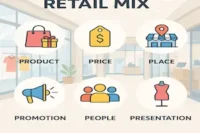What Is a Retail Format? A Simple Guide for Store Owners
Published: 01 Jul 2025
Ever wondered why some stores feel like mini-marts and others look like huge shopping malls? That’s because every store follows a different retail format.
A retail format is simply the way a store is set up to sell its products, like its size, layout, and the kind of shopping experience it offers.
In this blog, we’ll break down what retail formats are, why they matter, and how choosing the right one can help your business grow faster.
What is the retail format?
A retail format is the overall structure or setup a store uses to sell products to customers. It includes the store’s layout, size, product range, and how it serves shoppers. Different retail formats create different shopping experiences and help businesses target specific customer needs.
- A retail format is the way a store is organized to sell products.
- It includes layout, design, and product arrangement.
- Each format creates a different shopping experience.
- It helps store owners match their setup to customer needs.
Why is retail format important?
Retail format is important because it shapes how customers experience your store. The right format helps you attract the right audience, organize your products better, and manage your space and costs effectively.
It also sets the tone for your brand, whether you want a casual street shop or a high-end showroom. Choosing the right retail format can directly impact sales, customer satisfaction, and long-term growth.
- It directly affects how your business runs and how customers feel in your store.
- Helps you create the right shopping experience
- Attracts your target customers
- Makes your store layout more organized
- Controls your space, staff, and cost needs
- Supports your brand’s image and purpose
- Boosts sales and customer satisfaction
Types of retail formats
Retail formats are different ways businesses set up their stores to sell products. Each format offers a unique shopping experience and serves a specific purpose. Here are the main types explained in simple terms:
Department Store
A department store is a large retail space divided into sections or “departments,” each selling different types of products like clothing, electronics, home goods, and more. It offers customers everything under one roof with a wide variety of choices.
Supermarket
A supermarket is a self-service retail store mainly focused on selling groceries, fresh produce, dairy, meat, and household essentials. It is designed for quick and convenient shopping, usually with fixed prices and organized shelves.
Specialty Store
A specialty store focuses on one type of product or a specific category, like shoes, books, or toys. These stores offer a deep selection of products in that niche, often with expert staff to help customers make the right choice.
Convenience Store
A convenience store is a small, local shop that stays open for long hours and sells everyday items like snacks, drinks, toiletries, and basic groceries. It’s perfect for quick purchases and is usually found in neighborhoods or near petrol stations.
Discount Store
A discount store sells products at lower prices than regular stores. These stores often stock branded or non-branded items at a discount, appealing to budget-conscious customers who want value for money.
E-commerce Store
An e-commerce store is a digital shop that sells products through a website or mobile app. Customers can browse, order, and pay online, and the items are delivered to their doorstep. It requires no physical space and runs 24/7.
Kiosk or Pop-Up Shop
A kiosk or pop-up shop is a small, often temporary retail space usually set up in malls, events, or busy public areas. These formats are great for testing products, launching new items, or reaching customers in high-traffic areas.
Choose the best retail format for your business
Each retail format fits different business goals, budgets, and customer needs. Let’s match the right type with the right user:
Department Store
Best for: Big businesses with a wide product range.
It suits store owners who want to sell many categories—like fashion, electronics, and home items—in one place.
Supermarket
Best for: Retailers selling groceries and daily essentials.
Great for targeting regular shoppers who need food, household items, and personal care products in one trip.
Specialty Store
Best for: Niche sellers focused on one product type.
Ideal for businesses that sell only shoes, books, baby items, or electronics, and want to stand out in their category.
Convenience Store
Best for: Small business owners in busy or residential areas.
Perfect for selling fast-moving goods to customers who need quick, nearby access to basic items.
E-commerce Store
Best for: Sellers who want to run a business online with lower startup costs.
Ideal for reaching more people without needing a physical space—especially useful for home-based or digital-first brands.
Kiosk or Pop-Up Shop
Best for: New brands or seasonal businesses.
Great for testing products, launching new items, or reaching customers in malls, events, or high-traffic areas without long-term cost.
Conclusion
So, guys, in this article, we’ve covered the retail format in detail.
If you’re just starting your store, I recommend choosing a format that matches your product and customer type—don’t go big too fast. Start small, test, and grow.

- Be Respectful
- Stay Relevant
- Stay Positive
- True Feedback
- Encourage Discussion
- Avoid Spamming
- No Fake News
- Don't Copy-Paste
- No Personal Attacks



- Be Respectful
- Stay Relevant
- Stay Positive
- True Feedback
- Encourage Discussion
- Avoid Spamming
- No Fake News
- Don't Copy-Paste
- No Personal Attacks




